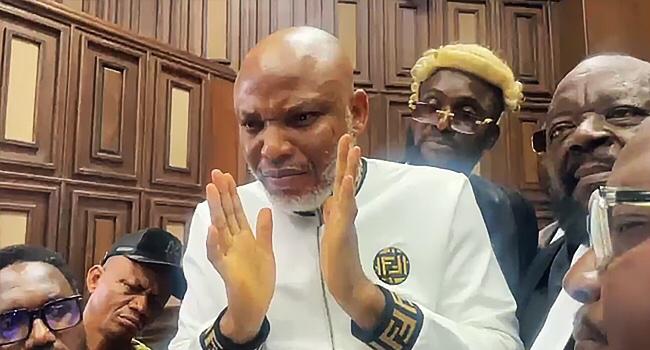The arrest of Nnamdi Kanu, the leader of the Indigenous People of Biafra (IPOB), has been a polarizing topic in Nigeria and beyond, sparking debates about sovereignty, international law, and the role of Nigeria’s Department of State Services (DSS). Recently, the DSS issued a statement distancing itself from Kanu’s controversial arrest in Kenya, asserting that its operations are strictly limited to Nigeria’s territorial borders. This development raises questions about the circumstances of Kanu’s detention, the actors involved, and the broader implications for Nigeria’s political landscape. In this blog post, we’ll dive deep into the details of this unfolding saga, exploring the DSS’s stance, the context of Kanu’s arrest, and the ripple effects on Nigeria’s socio-political environment.
The Background: Who is Nnamdi Kanu and What is IPOB?
To understand the significance of the DSS’s statement, it’s essential to contextualize Nnamdi Kanu and the Indigenous People of Biafra (IPOB). Kanu, a British-Nigerian activist, founded IPOB in 2012 to advocate for the secession of southeastern Nigeria to form an independent state of Biafra. The group’s demands stem from longstanding grievances among some Igbo communities, who feel marginalized within Nigeria’s political and economic structures. IPOB’s activities, including protests and media campaigns, have often clashed with the Nigerian government, which labels the group a terrorist organization.
Kanu’s activism has made him a polarizing figure. To his supporters, he is a freedom fighter championing self-determination; to the Nigerian government, he is a threat to national unity, accused of inciting violence and promoting separatism. Kanu was first arrested in 2015 in Nigeria on charges of treasonable felony, leading to a high-profile trial. He was granted bail in 2017 but fled the country after alleging threats to his life, only to resurface in Kenya in 2021, where he was arrested under controversial circumstances.
Nnamdi Kanu’s arrest in Kenya in June 2021 sent shockwaves across Nigeria and the international community. Reports suggested that Kanu, who had been living abroad while continuing his activism through Radio Biafra, was apprehended in Nairobi and extradited to Nigeria. The operation was shrouded in secrecy, with conflicting narratives about how it was executed and who was involved. Kanu’s legal team and IPOB alleged that he was “kidnapped” in Kenya, raising concerns about the legality of the arrest and potential violations of international law.
The Nigerian government confirmed Kanu’s arrest, stating that he was intercepted through a collaborative effort involving security agencies. However, details about the operation remained sparse, fueling speculation about foreign involvement. Kenya’s government faced accusations of complicity, with some reports suggesting that Kenyan authorities facilitated Kanu’s transfer to Nigeria. These claims strained diplomatic relations, as IPOB supporters and human rights groups demanded clarity on whether Kenya violated Kanu’s rights as a British citizen or breached international protocols on extradition.
In a surprising twist, the Department of State Services (DSS), Nigeria’s primary domestic intelligence agency, recently issued a statement distancing itself from Kanu’s arrest in Kenya. The DSS emphasized that its mandate and operations are strictly limited to Nigeria’s territorial borders, effectively denying any involvement in the overseas operation. This statement has added a new layer of complexity to the narrative, prompting questions about which agencies or actors orchestrated Kanu’s apprehension.
The DSS’s clarification could be interpreted in several ways. First, it may be an attempt to deflect criticism and legal scrutiny, given the contentious nature of Kanu’s arrest. By asserting that its operations are confined to Nigeria, the DSS may be seeking to avoid accusations of overstepping its jurisdiction or violating international law. Second, the statement could point to the involvement of other entities, such as Nigeria’s National Intelligence Agency (NIA), which handles external intelligence, or even foreign partners. The lack of transparency about the arrest has fueled speculation about a multinational operation, possibly involving intelligence-sharing or logistical support from Kenya or other nations.
The DSS’s statement has significant implications for Kanu’s ongoing trial and Nigeria’s broader political landscape. Kanu is currently facing charges of terrorism, treasonable felony, and illegal possession of firearms, among others. His legal team has argued that his arrest was unlawful, citing irregularities in the extradition process and alleging human rights abuses. The DSS’s denial of involvement could bolster these claims, potentially complicating the prosecution’s case if the court demands clarity on how Kanu was brought to Nigeria.
Politically, the DSS’s statement may be an effort to de-escalate tensions in southeastern Nigeria, where IPOB enjoys significant support. Kanu’s arrest and trial have sparked protests, violence, and economic disruptions in the region, with IPOB enforcing sit-at-home orders that paralyze local commerce. By distancing itself from the controversial aspects of the arrest, the DSS may be attempting to reduce its exposure to public backlash while allowing the government to focus on the legal proceedings.
The international dimension of Kanu’s arrest cannot be ignored. As a British citizen, Kanu’s detention has drawn attention from the UK government and human rights organizations. The British High Commission in Nigeria has sought consular access to Kanu, raising questions about whether his rights as a foreign national were upheld during his arrest and extradition. Human rights groups, including Amnesty International, have criticized the operation, calling for transparency and accountability.
The DSS’s claim that it operates only within Nigeria’s borders may also be a response to these international pressures. By clarifying its non-involvement in the Kenya operation, the agency may be seeking to avoid accusations of complicity in any potential breaches of international law. However, this raises further questions about who was responsible for Kanu’s arrest and whether proper extradition protocols were followed.
The controversy surrounding Kanu’s arrest and the DSS’s statement reflects broader challenges facing Nigeria. The country is grappling with multiple security threats, including Boko Haram insurgency in the northeast, banditry in the northwest, and separatist agitations in the southeast. IPOB’s campaign for Biafra taps into deep-seated grievances about marginalization, resource allocation, and political representation, which the Nigerian government has struggled to address.
The DSS’s role as Nigeria’s domestic intelligence agency places it at the heart of these challenges. While the agency has denied involvement in Kanu’s arrest abroad, its domestic operations have been central to the government’s efforts to curb IPOB’s activities. Critics argue that the DSS’s tactics, including mass arrests and alleged human rights abuses, have sometimes exacerbated tensions rather than resolving them. The agency’s statement on Kanu’s arrest may be an attempt to refocus attention on its domestic mandate while navigating the complex interplay of national security and public perception.
As Kanu’s trial continues, the DSS’s statement is unlikely to quell the controversy surrounding his arrest. IPOB and its supporters will likely continue to demand answers about the operation in Kenya, while the Nigerian government faces pressure to justify its actions both domestically and internationally. The DSS’s assertion that it operates only within Nigeria’s borders may prompt further scrutiny of other agencies, such as the NIA, and their roles in cross-border operations.
For now, the focus remains on Kanu’s legal proceedings and the broader implications for Nigeria’s unity. The government’s handling of the case could either deepen divisions in the southeast or provide an opportunity for dialogue and reconciliation. Meanwhile, the international community will be watching closely to ensure that Kanu’s rights are upheld and that the rule of law prevails.
The Department of State Services’ decision to distance itself from Nnamdi Kanu’s arrest in Kenya has added a new dimension to an already complex and controversial saga. By emphasizing its domestic mandate, the DSS has sought to clarify its role while raising questions about the actors and methods involved in Kanu’s detention. As Nigeria navigates this high-stakes situation, the interplay of national security, international law, and human rights will continue to shape the narrative. For those following this story, the coming months promise further developments that could have far-reaching consequences for Nigeria’s political and social landscape.
Join our Whatsapp channel to stay updated always!


